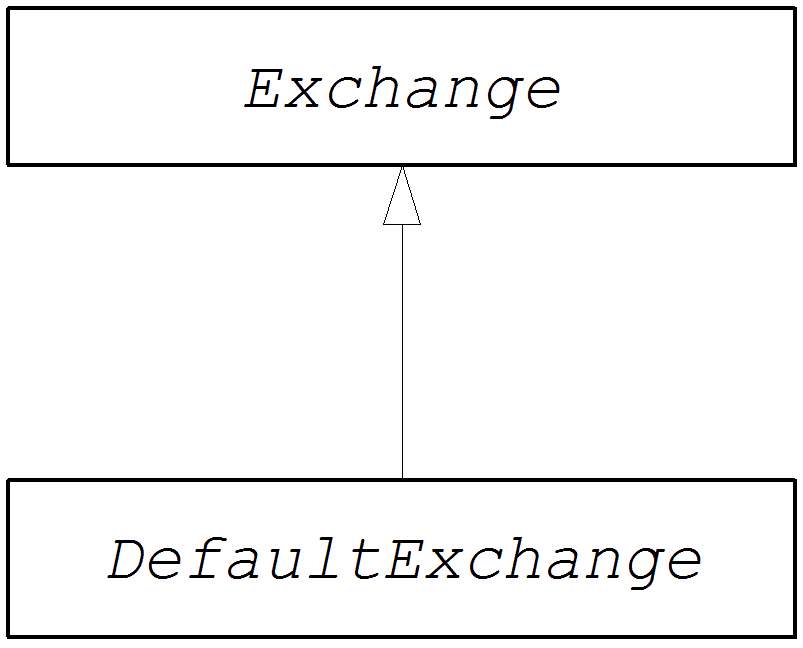Dieser Inhalt ist in der von Ihnen ausgewählten Sprache nicht verfügbar.
Chapter 43. Exchange Interface
Abstract
This chapter describes the Exchange interface. Since the refactoring of the camel-core module performed in Apache Camel 2.0, there is no longer any necessity to define custom exchange types. The DefaultExchange implementation can now be used in all cases.
43.1. The Exchange Interface
Overview
An instance of org.apache.camel.Exchange type encapsulates the current message passing through a route, with additional metadata encoded as exchange properties.
Figure 43.1, “Exchange Inheritance Hierarchy” shows the inheritance hierarchy for the exchange type. The default implementation, DefaultExchange, is always used.
Figure 43.1. Exchange Inheritance Hierarchy
The Exchange interface
Example 43.1, “Exchange Interface” shows the definition of the org.apache.camel.Exchange interface.
Example 43.1. Exchange Interface
Exchange methods
The Exchange interface defines the following methods:
getPattern(),setPattern()— The exchange pattern can be one of the values enumerated inorg.apache.camel.ExchangePattern. The following exchange pattern values are supported:-
InOnly -
RobustInOnly -
InOut -
InOptionalOut -
OutOnly -
RobustOutOnly -
OutIn -
OutOptionalIn
-
-
setProperty(),getProperty(),getProperties(),removeProperty(),hasProperties()— Use the property setter and getter methods to associate named properties with the exchange instance. The properties consist of miscellaneous metadata that you might need for your component implementation. setIn(),getIn()— Setter and getter methods for the In message.The
getIn()implementation provided by theDefaultExchangeclass implements lazy creation semantics: if the In message is null whengetIn()is called, theDefaultExchangeclass creates a default In message.setOut(),getOut(),hasOut()— Setter and getter methods for the Out message.The
getOut()method implicitly supports lazy creation of an Out message. That is, if the current Out message isnull, a new message instance is automatically created.-
setException(),getException()— Getter and setter methods for an exception object (ofThrowabletype). -
isFailed()— Returnstrue, if the exchange failed either due to an exception or due to a fault. -
isTransacted()— Returnstrue, if the exchange is transacted. -
isRollback()— Returnstrue, if the exchange is marked for rollback. -
getContext()— Returns a reference to the associatedCamelContextinstance. -
copy()— Creates a new, identical (apart from the exchange ID) copy of the current custom exchange object. The body and headers of the In message, the Out message (if any), and the Fault message (if any) are also copied by this operation. -
setFromEndpoint(),getFromEndpoint()— Getter and setter methods for the consumer endpoint that orginated this message (which is typically the endpoint appearing in thefrom()DSL command at the start of a route). -
setFromRouteId(),getFromRouteId()— Getters and setters for the route ID that originated this exchange. ThegetFromRouteId()method should only be called internally. -
setUnitOfWork(),getUnitOfWork()— Getter and setter methods for theorg.apache.camel.spi.UnitOfWorkbean property. This property is only required for exchanges that can participate in a transaction. -
setExchangeId(),getExchangeId()— Getter and setter methods for the exchange ID. Whether or not a custom component uses an exchange ID is an implementation detail. -
addOnCompletion()— Adds anorg.apache.camel.spi.Synchronizationcallback object, which gets called when processing of the exchange has completed. -
handoverCompletions()— Hands over all of the OnCompletion callback objects to the specified exchange object.
